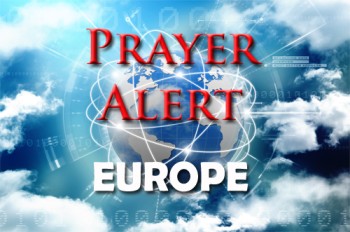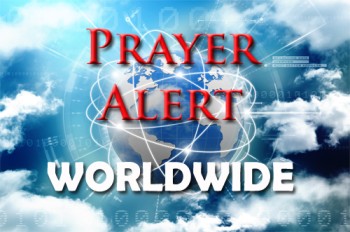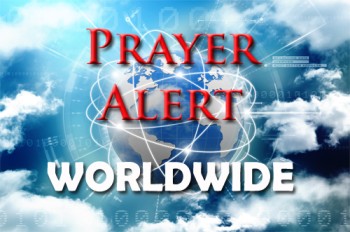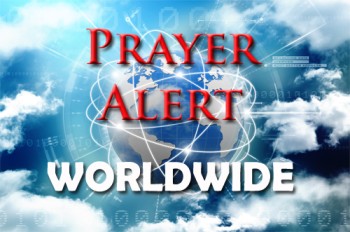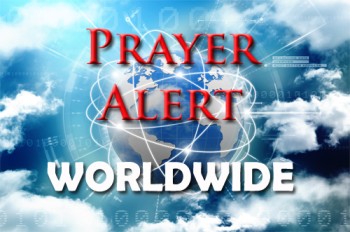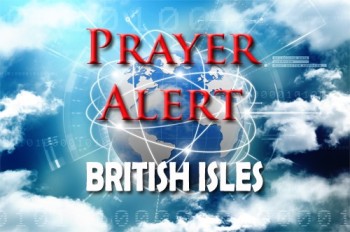
David Fletcher
David Fletcher is Prayer Alert’s Editor.
He is part of a voluntary team who research, proof-read and publish Prayer Alert each week.
If you would like to make a donation towards our running costs, please click here.
On 11 July thirty Kurdistan Workers’ Party (PKK) fighters publicly disarmed in Sulaimaniyah, northern Iraq, marking the start of a renewed peace process with Türkiye aimed at ending a forty-year conflict that has claimed around 40,000 lives. Following a call in February by jailed PKK leader Abdullah Ocalan to end armed struggle, senior PKK leaders agreed to political engagement in April. The process may lead to amnesty for fighters and the restoration of political and cultural rights for Kurds within Türkiye. However, analysts warn that the Turkish government’s secrecy around the process raises questions about public support and long-term success. The Kurdistan Regional Government (KRG) in Iraq has so far remained neutral, though local parties may use the peace process for political gain. Meanwhile, the PKK has incentives to disarm, because it is militarily weaker than it was and is more marginalised. However, if the process fails, violence could return to Iraq’s Qandil Mountains, further destabilising the region and risking renewed conflict between the PKK and Turkish forces.
Deadly violence has erupted in Suweida between Druze militias and Bedouin tribes, resulting in at least two hundred deaths, including children and civilians. The fighting, which began after the abduction of a Druze merchant, quickly escalated, prompting Syria's interim government to send troops into the previously autonomous Druze region. Israel launched airstrikes against these troops, claiming they were targeting the Druze, with whom Israel shares strong ties. The strikes drew international criticism and further inflamed tensions. Despite a ceasefire declared by Syria’s defence minister, reports emerged of government forces bombing Suweida, executing Druze civilians and looting homes. A Druze spiritual leader initially called for cooperation with authorities, but later urged resistance. Syria accused Israel of full responsibility for the violence, while the USA urged Israel to halt its strikes. The Israeli military has already carried out hundreds of strikes across Syria to destroy the country's military assets since the fall of the Assad regime. Breaking news: Israel has now bombed Damascus, targeting the presidential palace and the ministry of defence building. See
Labour and social security minister Marta Feito Cabrera has resigned following widespread backlash over her comments denying the existence of poverty and homelessness in Cuba. Speaking in the National Assembly, Feito claimed that those seen begging were merely ‘disguised’ and that street workers and recyclers lived ‘easy’ lives funded by untaxed income. Her remarks provoked outrage from citizens and leaders alike, including the president, who criticized the lack of empathy and said that the revolution should not leave anyone behind. Amid Cuba’s worsening economic crisis, due partly to the longstanding and widely criticised US sanctions (recently tightened by Donald Trump) but also to fuel shortages and inflation, many are struggling to access basic needs. Feito’s resignation was accepted after she ‘acknowledged her errors’. The incident has sparked renewed debate on the government's handling of poverty, inequality, and transparency.
Five Christians were killed and three others injured during a Bible study on Friday in Kaduna State by armed Fulani extremists. The victims, members of the Evangelical Church Winning All (ECWA), had gathered peacefully when the attackers struck. The killings are part of a continuing pattern of violent persecution targeting Christian farming communities in the Middle Belt region, where believers live in constant fear. The area has seen 110 kidnappings in the past six months, with many communities unable to sleep safely or work their land. Despite persistent attacks, the Nigerian government is widely criticised for its inaction. International voices have called for Nigeria to be redesignated as a Country of Particular Concern. While this designation was made under the Trump administration in 2020, it was removed by the Biden administration in 2021 without explanation, a move condemned by religious freedom advocates. Nigeria remains the deadliest country for Christians globally, with 90% of Christian martyrs in 2022 killed there.
Air quality alerts have been issued across Canada and northern USA as smoke from widespread wildfires continues to degrade air conditions, prompting urgent health warnings. Environment Canada has warned residents, especially in Ontario and Toronto (where air quality recently ranked among the worst globally), to limit outdoor exposure. Similar alerts have been issued in US cities like Chicago, where unhealthy ozone levels and residual smoke from Canadian fires are posing additional concerns. Wildfires raging across Manitoba, Saskatchewan, and northern Ontario have forced tens of thousands to evacuate, with emergency responders working to assess the rapidly changing situation. Also, political tensions emerged after some Congress members said Canada’s wildfires were ‘making it difficult for Americans to enjoy their summer’. Scientists attribute the increasing intensity and frequency of wildfires to climate change; Canada is believed to be warming at twice the global rate.
Human-elephant conflict in Malaysia has resulted in nearly five thousand complaints and RM40 million (£7 million) in losses over the past four years, prompting conservationists to call for a deeper, more strategic approach than the long-standing practice of elephant translocation. Prof Dr Ahmad Ismail of the Malaysian Ecological Association stressed the need for a comprehensive understanding of elephant biology, behaviour, and ecology to manage habitats effectively. He also called for strengthening ecological corridors and fostering cooperation with state governments. Meanwhile, the government wildlife department has initiated a year-long translocation operation involving 25 elephants, beginning in Johor and expanding to other conflict-prone states. A commentator, noting that limited natural landscapes leave elephants with nowhere to roam, says, ‘The elephants and all other forms of wildlife were here first’. This discussion underscores the need for proper funding and stronger commitment to preserving Malaysia’s remaining forests and natural resources.
A political storm is brewing in Washington as divisions deepen over the Trump administration's refusal to release files related to deceased sex offender Jeffrey Epstein. House speaker Mike Johnson, a close Trump ally, broke ranks by expressing public support for the files' release, citing the need for transparency. However, he later voted to block a Democrat-led resolution calling for that very action. The justice department, led by attorney general Pam Bondi, denies the existence of a client list in the files, and maintains the matter is closed - sparking outrage among both Democrats and Trump’s MAGA supporters, who had been promised accountability. While bipartisan lawmakers are pressing for a House vote, Democrats in Congress and the Senate are pushing legislation to preserve and disclose all Epstein-related documents. The issue has become a flashpoint for demands for transparency and oversight, exposing cracks within the GOP and giving Democrats an opportunity to frame themselves as champions of accountability and reform.
Candace Cameron Bure has opened up about a deeply challenging season in her marriage to husband Valeri during 2020, revealing that they were close to separation. The turning point came unexpectedly through their eldest son, Lev. Although unmarried at the time, Lev confronted his parents with a heartfelt, Bible-based exhortation about marriage. In a recent podcast, Candace recalled Lev speaking for 45 minutes, Bible open, urging his parents to consider whether they had done everything possible to reconcile, and to offer further grace and kindness to each other. His gentle firmness and spiritual insight deeply moved his parents, prompting them to reflect and recommit to working through their difficulties. Candace described the conversation as a 'pivotal moment' which transformed the couple’s relationship. She expressed profound gratitude for her children’s courage and spiritual maturity, crediting their family’s legacy of Christ-centred marriages as a sustaining influence. Lev has since married Elliot Dunham, continuing the family’s legacy. Candace celebrated the wedding as a Spirit-filled, Gospel-focused occasion, underscoring their generational faith.
In Iran, one of the world’s most dangerous places to be a Christian, the underground church is growing remarkably. Amid an oppressive regime enforcing Twelver Ja’afari Shia Islam, over one million believers now worship in secret, making Iran home to the fastest-growing Christian population globally. These followers meet discreetly in house churches of no more than fifteen people, risking arrest, loss of livelihood, and severe punishment. Stories like Azam’s highlight this courage: shunned for pregnancy outside marriage, she found hope in Christ through a Christian woman’s witness, discovering the One who bears shame and offers new life. Despite surveillance, threats, and societal rejection, Iranian Christians embody a faith purified through suffering, reminding believers worldwide that Christianity is not defined by comfort or buildings but by a willingness to risk all for Jesus. Their example challenges Western believers to strip away distractions and embrace genuine, sacrificial faith. Ministries like ICM partner with the underground church, discreetly distributing Scripture via micro SD cards, ensuring the Gospel continues to spread even in the darkest circumstances.
The UN has sharply criticised the Government’s proposed welfare reforms, warning they could significantly worsen poverty among disabled people. Following a recent parliamentary vote that passed the benefits bill by 75 votes, secured only after last-minute concessions to Labour rebels, the UN’s committee on the rights of persons with disabilities has raised ten pressing concerns about the legislation. Key issues include politicians’ rhetoric suggesting disabled individuals exploit benefits and the reforms’ potential impact on young claimants, women with disabilities, and those requiring high-level support. The UN warns that the bill could deepen existing economic hardship, echoing findings from earlier reports which linked previous welfare cuts to increased food bank reliance, homelessness, and mental health crises. Disability advocates have condemned the reforms as punitive, urging MPs to consider the profound human consequences before advancing the legislation. Parliament will further debate the bill in the coming days, amid mounting national and international scrutiny. See

